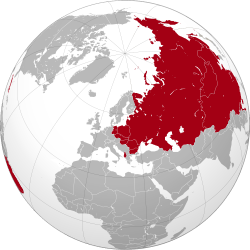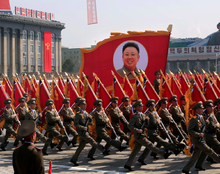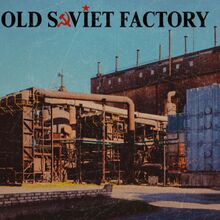Socialist Soviet Empire
This article or section marked as work-in-progress has not been edited in over seven days, but further work is required. Please notify the user who first added this template. |
Socialist Soviet Empire | |
|---|---|
| Motto: Пролетарии всех стран, соединяйтесь! "Workers of the world, unite under the crown!" | |
| Anthem: "The Internationale" | |
 Countries in which Sovietria had territorial claims to factories in red | |
| Capital and largest city | Trotskygrad |
| Official languages | Esperanto (in Cyrillic script) |
| Common languages | |
| Ethnic groups (2023) | 100% Workers |
| Religion (2023) | Secular state (de jure) State Atheism (de facto) |
| Demonym(s) | Sovietrian, Soviet |
| Government | Unitary one-party trotskyist absolute monarchy |
• Emperor | vacant |
| Karl-Albrecht von Norbrengen | |
| Luísa Somme | |
| vacant | |
| Legislature | Supreme Soviet |
| Formation | |
• Creativity Revolution | 25 August 2016 |
• Treaty of Creation | 08 July 2020 |
| 22 July 2020 | |
• Activity Revolution | 01 February 2021 |
• Arthur's abdication | 04 November 2022 |
• Andrey's deposition | 01 March 2023 |
| Area | |
• Total | 0.1 km2 (0.039 sq mi) |
• Water (%) | 0% |
| Population | |
• 2020 estimate | Unclear |
| GDP (PPP) | 2020 estimate |
• Total | Undeclared |
• Per capita | Undeclared |
| GDP (nominal) | 2020 estimate |
• Total | Undeclared |
• Per capita | Undeclared |
| Gini | low |
| HDI (2023) | ▼ 0.700 high · 116th |
| Currency | Currency abolisheda (None) |
| Time zone | UTC−3 (BRT (de facto)) |
• Summer (DST) | UTC−2 (BRST) |
| Date format | dd/mm/yyyy |
| Driving side | left |
| Calling code | +55 (de facto) |
| Internet TLD | .se |
| |
The Socialist Soviet Empire (Esperanto Cyrillic: Социалистическая Советская Империя), commonly known as Sovietria, is a self-declared communist state, commonly referred to as a micronation, which claims as sovereign territory the factories of the countries of the former Eastern Bloc following the Tito–Stalin split plus factories in Cuba and Brazil, from which the state is effectively captained. The Sovietrian State has no illusions of controlling the territory it claims, and it is public that its claim is purely symbolic. However, for administrative purposes, the only territory under Sovietrian control is its capital Trotskygrad, named after Leon Trotsky. The nation adopts Esperanto as its official language, whose use as an international language was suggested by the revolutionary socialists, but using Cyrillic script in order to evoke the Slavic roots of soviet communism.
The foundation of a communist-monarchist state was idealized in 2016 by the Brazilian micronationalist Arthur van der Bruyn. To this end, Arthur, as the King of Roschfallen that he was at the time, issued an edict allowing him to assume another crown or sovereign position in another country in ex officio capacity. Years later, in 2020, Arthur finally founded the Soviet state, claiming the ideological continuation of the Trotskyist ideal and, claiming the factories of former communist European countries alongside Cuba and his home country, Brazil, as territory of the micronation. This is because factories were the main environment of the workers oppressed by the ruling classes during the second industrial revolution in the late 19th and early 20th centuries and which became the stage of the communist revolutions that took several countries. After its founding, Sovietria was quickly recognized by the member states of the Conference of Santiago, and twenty days later its constitution was promulgated, establishing the country as a unitary one-party trotskyist socialist states under a absolute monarchy.
The creation of the Sovietrian State generated controversy, but the micronation was seen as revolutionary in the Brazilian sector and its predecessor, the Lusophone sector, in its position and its complaints. National politics is dominated by the Trotskyist Workers' Party, successor to the Soviet Communist Party. The Sovietrian Government is famously extremely secretive about its data, particularly population and economic data. The country is classified as a small power in its sector and a puppet state, if not a personal state, of Arthur van de Bruyn, current King of Ebenthal and Duke of Marienbourg, who despite having abdicated the Sovietrian throne in late 2022, resumed control over the state without a formal position after the overthrow of the Emperor Andrey I. Sovietrian citizenship can be aquired by online application, provided the applicant it is a worker or a oppressed peasant.
Etymology
The Common Pact between the People, Workers and Peasants and the Crown, constitutional document of Sovietria, after due amendment in April 2023, defines the name of the sovereign state in its first article:
Art. 1. The Socialist Soviet Empire is a socialist state of the whole people, expressing the will and interests of the workers, peasants, and intelligentsia, the working people of all the nations and nationalities of the country.
— Sovietian Constitution
Inspired by the Soviet Union, the country's common and proper name of "Sovietria" is a corruption of the Russian word Sovet (Russian: совет), meaning 'council', 'assembly', 'advice', ultimately deriving from the proto-Slavic verbal stem of *vět-iti ('to inform'), related to Slavic věst ('news'), English wise, the root in ad-vis-or. The suffix "tria", originated from Greek (-τρα), denotes a feminine quality and was integrated into the word "Soviet" in order to identify the nation through a proper name and to differentiate it from the word Soviet which inadvertently leads to the name of the Soviet Union.
History
Inspirational background

In the nineteenth century factory workers and peasants worked under harsh conditions, long periods and for extremelly low wages. Workers or their representans in politics and media were constantly silenced in all possible ways by the governments in many countries, more notoriously, by the Imperial Russian Government. The Bloody Sunday, when unarmed demonstrators led by Father Georgy Gapon were fired upon by soldiers of the Imperial Guard as they marched towards the Winter Palace to present a petition to Tsar Nicholas II of Russia was the trigger to the real fight for the workers' rights and so to the 1905 Russian Revolution which turned the factories and peasants workplaces into political fields. Amidst the chaos, the Saint Petersburg Soviet was created with between 400 and 500 elected memberd by around 200.000 industrial workers. In late 1905, the exiled revolutionary Leon Trotsky returned from Siberia and assumed the soviet's control, calling off the general strikes fearing this would give the government an excuse for greater oppression and to better architect a plan. From then on the workers politized and the numbers of Soviets in Imperial Russia frew extensively.
With the outbreak of the 1917 Russian Revolution, more specifically following the October Revolution, the soviets led by Bolshevik Party came to power speaking for the workers. Led by Lenin and Trotsky, the bolsheviks started the needed changes in order to give the lower classes the power they lust. The Soviet Union was established as a communist ideocracy. However the new regime faced serious problems as Treaty of Brest-Litovsk, which ceded much of European Russian land to the formation of new countries following the First World War, the Red Army's brutality and the negative impact this had on the working classes to the ongoing Russian Civil War. Debates on several concerns hardened as individuals fought for the control of the country and party, with Lenin supporting Trotsky as his successor while Stalin acting in the shadows to overthrown the power and ultimatelly succeeding in it. As Stalin wasn't commited to the Communist ideal as much as to himself, the revolution fatally failed, but nonetheless it succeeded in inspire the establishment of several communist regimes, many of which forcibly imposed by the Soviet Union.
State building

In 2016, inspired by the history of the Russian revolutionary period and instigated by curiosity about what makes communism and the concept of monarchy incompatible, the Brazilian micronationalist Arthur van der Bruyn, who had reigned as the King of Roschfallen for two years, envisioned the development of a micronation that merged aspects of the Soviet Union and the Russian Empire, eventually adding traditional elements to the government of the former East Germany and Brazil, his country of origin.
Planning began with the adoption of symbols. Upon advice, Arthur opted for the creation of a empire in which all protocol elements should mention the people in order to evoke the regime's popularity (in the same fashion as a "people's republic"). The flag was adapted from the flag of the Soviet Union, however the red and yellow colors had their places changed, and the hammer in the traditional communist symbol of the hammer and sickle was replaced by a scepter with the fleur-de-lys, while the red star, mixing monarchical and communist symbols. Despite this initial development, the national project had not advanced. In 2018 Arthur was in contact with the communist branch of Trotskyism, idealized by Leon Trotsky, and after studying it in depth, he decided to introduce it as a state ideology once it was finally formally founded. Arthur described Trotrskyism as being "the institutionalized class struggle and the only communist model that fits Marx's proposals and Lenin's revolutionaryism without losing its essential characteristic of fighting the bourgeoisie and raising the proletarian". Nevertheless, planning for the future Sovietrian State included some provisions of Marxism-Leninism.
Foundation and contemporary era
By the mid 2020, after a few months since the establishment of the Brazilian sector, a Brazilian micronational sector for secessionist states that broke away from the former simulationist-dominated Lusophone sector , the political conflict between member states of the Conference of Santiago, an intermicronational organization created in that context and of which Arthur van der Bruyn is a member, now as King of Ebenthal, and the simulationist states intensified after an exchange of accusations of virtual terrorism between the simulationists and members of the United Provinces of Mauritia government. The leader of the group of simulationists led a state simulation called "German Empire". In order to irritate and humiliate him, Lucas VIII, Prince of Woenstein, the head of state of Mauritia, proposed the creation of a playful micronation on German territory. Thus the Nuremberg Commune was founded, claiming as territory a single park bench in the Stadtpark of Nuremberg. The decision to create a communist state, however facetious, was motivated in order to contradict the essentially traditional and autocratic monarchical worldviews of the simulationist leader.
So, inspired by the creation of the Commune, Arthur seized the moment and after four years of inconclusive planning he finally founded the Sovietian Empire. On 8 July 2020 he signed a Treaty of Creation in which he declared the objectives and territorial and historical-cultural claims of the nation-state which was initially called "Sovietia". At first Arthur, who assumed the title "Emperor of Soviet Workers", recruited experienced politicians from Ebenthal to assist him in the administration of Sovietia. Nevertheless, the micronational government did not advance much and eventually its political role became purely nominal, which culminated in the abdication of Arthur as Emperor on 1 November 2022 in favor of André Igino Chalegre, then Czaerisgrav of the State of Xingu, which intended to either adopt communism in the Xingu or establish a new communist state. André succeeded Arthur with the name of Andrey I and sought to reform Sovietia, however, after personal conflicts with members of governments of member states of the Conference of Santiago, Andrey became disenchanted with micronational administration, seeking to become a theorist of practice and de facto abandoned his duties as Emperor, having abdicated only his position in the Xingu. Consequently, on 1 March 2023 the Supreme Soviet resolved to dethrone him and elevate the former Emperor to the unofficial position of People's Custodian of the State, equivalent to Regent.
Upon having absolute control over Sovietia restored, Arthur initiated a profound structural and administrative reform, while he himself not only refused to reassume his imperial title but to assume any official position in the government. Among his main reforms is the change of the proper and official name of the country from "Sovietia" to "Sovietria" and from "Sovietian Empire" to "Socialist Soviet Empire".
Geography

Claimed area
Sovietria claims as its sovereign territory all factories in the countries of the former Eastern Bloc after the Tito-Stalin split, i.e. the factories in the Russia, Ukraine, Belarus, Estonia, Latvia, Lithuania, Moldova, Georgia, Armenia, Azerbaijan, Kazakhstan, Kyrgystan, Uzbekistan, Turkmenistan, Tajikistan,Mongolia, China, North Korea, Vietnam, Romania, Poland, Hungary, Bulgaria, Czechia, Slovakia, Albania, the eastern part of Germany corresponding to former East Germany, plus the factories in Cuba and Brazil, which despite never having been a communist country, is the home country of most members of the Sovietrian government.
The State recognizes that it does not have control over its claimed territories and has no illusions of controlling them, emphasizing in an official capacity that its claims are purely symbolic but that if these territories eventually seek the Sovietrian administration, the State would not hesitate to control them. However, Sovietria has a single territory under its control, corresponding to 0.1km² (0.039 sq mi) of uninhabited land in Brazil, which is nominally its capital, the municipality of Trotskygrad. Due to this, the country de facto abides by the Brazilian time zone, the UTC−3, and the summet time zone UTC−2.
Government and politics
The Sovietian Empire is constitutioanlly defined as an unitary trotskyist one-party socialist state under an absolute monarchy and is regarded as an authoritarian regime. As a one-party state, the only legal party is the Sovietian Worker's Party. The General Secretary of the Worker's Party, the nation's head of government, is elected by the party's Central Committe and, under approval of the country's unicameral legislature, the Supreme Soviet, becomes the Sovietian Emperor and head of state, occupying at the sime time the two highest offices in the Sovietian Empire. The Emperor and General Secretary exercises his powers by appointing the nation's Council of People's Comissars, including the Chairman of the Council of People's Commissars of Sovietia who deals with the country's day-to-day political affairs. Judiciary authority is under the Chairman of the People's Supreme Court of Sovietia, appointed by the Chair of the Council of People's Comissars. All the country's powers are officialy vested upon the people, but are exercized by the monarch, as their supreme representant, and by his government, on their behalf.
Sovietia's unitarism and lack of physical territory to actually administrate works in the form of groups of Sovietian citizens geographically close to each other which were considerate Autonomous Municipalities, and Worker's Territories which was the official designation for the uninhabited factories in Brazil and Eastern Europe claimed but not administrated by the Sovietian Government. There are currently two Autonomous Municipalities in Sovietia, besides the capital, Trotskygrad, and 21 Worker's Territories. Furthermore, the On-line spaces, officialy designated as People's Spaces, are counted as a separate type of administrative entity. While Autonomous Municipalities are anarchical, having no formal government other than the people's will, Worker's Territories and People's Spaces are directly under the Central Government's jurisdiction.
Law
Military
Foreign policy
Economy
Infrastructure
Demographics
Race and ethnicity
Religion
Language
Culture
Architecture
Music
Literature
Cuisine
Sports
National holidays
See also
References
- ↑ A Sound Effect. Olf Soviet Factory. Retrieved on 28 March 2021.

